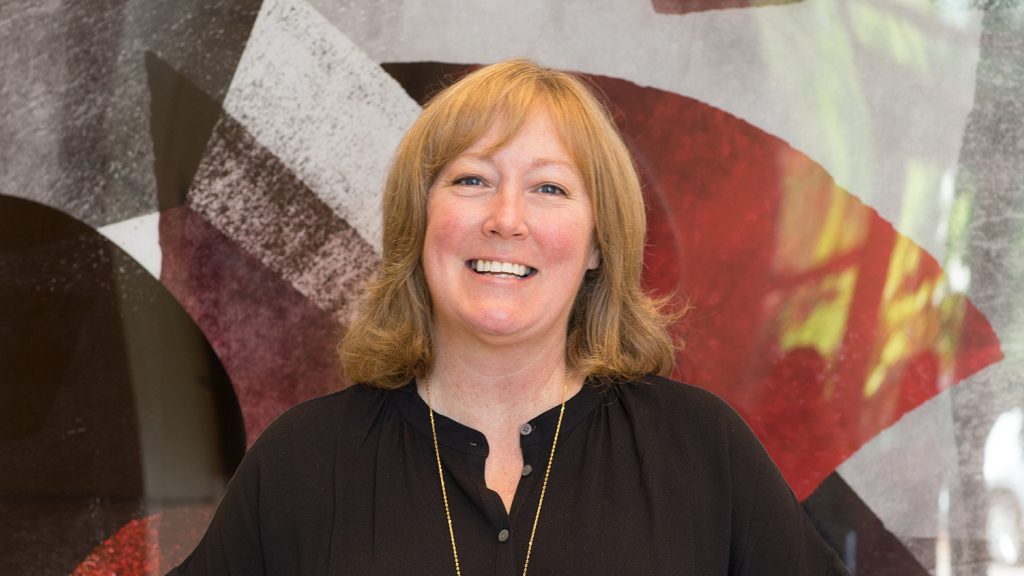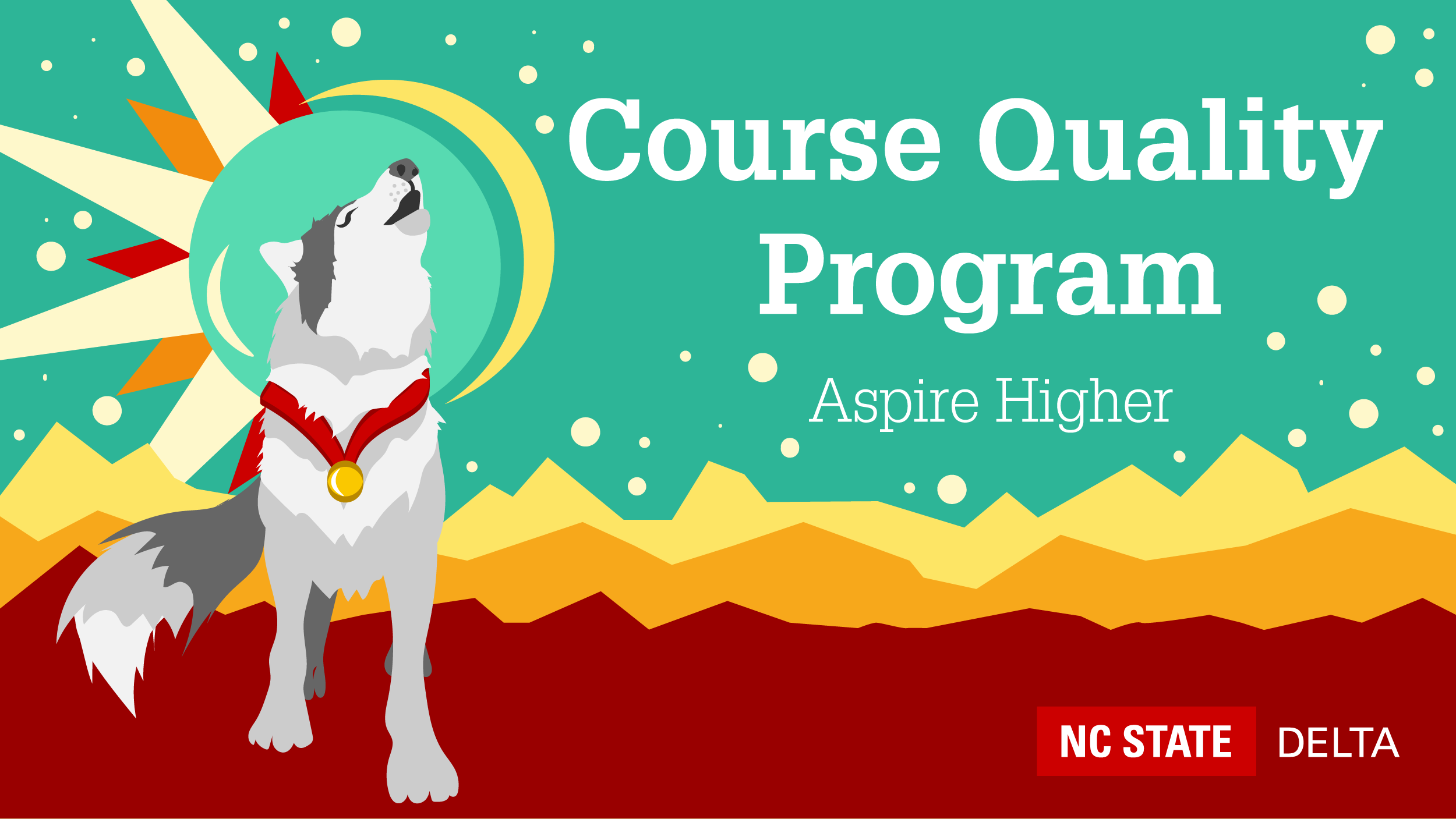NC State is committed to providing all students with exceptional, innovative learning experiences — whether those experiences are in person, fully online or in a hybrid learning environment.
With the exponential growth of online learning in the last few years, course design training opportunities that highlight best practices for ensuring student success while leveraging the newest instructional tools are in great demand. DELTA’s Course Quality (CQ) Program supports this commitment to our students by providing NC State instructors with a comprehensive menu of services, resources and research to ensure the quality of their online and hybrid courses.
Built on the foundations of the globally-recognized standards-based Quality Matters (QM) program, Course Quality at DELTA prioritizes continuous improvement in digital teaching and learning environments through exceptional professional development and training opportunities.
With more than 14,000 NC State students enrolled each year in a QM-certified course, the impact is clear: the CQ Program supports the success of thousands of online students with high-quality, innovative learning experiences.
Course Quality Program Impact
DELTA’s Course Quality Program has positively influenced the instructional process and goals of hundreds of NC State instructors, improving learning outcomes for thousands of NC State students in a variety of course formats and disciplines.
To date, more than 200 NC State faculty and staff have completed the Applying the Quality Matters Rubric training, Quality Matters’s flagship workshop on the QM Higher Education Rubric and its use in reviewing the design of online and blended courses.
“The Quality Matters program has had a profound impact on my course design and teaching,” said new CQ Faculty Mentor Andrew Branan, assistant extension professor of Agricultural and Resource Economics. “The QM review preparation forced my attention to the criticality of developing measurable goals, and to how my lectures, activities and assessments worked together to help the student achieve those goals — it forced me to see the course through the eyes of a student.”
In addition, 75 NC State courses have been Quality Matters certified, having undergone a rigorous external course review process to receive the certification. Every college at NC State has at least one certified QM course, while the Leadership in the Public Sector online program has been fully certified.
“The Course Quality Program informed revisions to all of my courses to bring them in alignment with the QM rubric,” said new CQ Faculty Mentor Jessica Thomas, an associate professor of practice in the Poole College of Management. “The CQ Program has had a strong positive impact on both my undergraduate and my graduate students who have commented directly to me and in course evaluations on the accessibility, clarity and impact of my courses.”

Professional Development and Training Opportunities
DELTA’s Course Quality Program offers NC State instructors a variety of opportunities for professional development and course improvement.
The Course Improvement Grant facilitates instructors’ understanding and application of QM standards. This grant involves a deep exploration of each standard, practice with applying the standard to a course and collaboration with mentors and peers. Instructors who successfully complete the Course Improvement Grant are then eligible to serve the CQ Program as:
- Peer Reviewers, performing internal reviews of online or hybrid courses that have met QM eligibility requirements.
- Faculty Mentors, offering peers a real-world perspective and expertise in the application of the QM rubric and standards.
- Research Fellows, contributing to the research and application of the QM rubric and standards.
The Faculty Mentor program has proved highly successful for instructors pursuing QM certification. “I was very fortunate to have an outstanding CQ Mentor, Kevin Oliver, and envision a similar approach to his as a mentor myself,” Thomas said. “Kevin was very engaged and supportive throughout, sharing detailed feedback as I progressed through the course, insight from his own experience and encouragement during challenging times.”
Applying the Quality Matters Rubric training is offered free of charge throughout the year in both synchronous in-person and asynchronous online formats. This training offers a high-level overview of quality course design and best practices intended for a broad audience of faculty, instructional designers, administrators and adjunct instructors.
The QM training had an enormous impact on Christine Cranford’s teaching in the NC State Professional Writing Program. “Applying the QM rubric allowed me to see my online course through a student’s viewpoint,” she explained. “The applied general standards helped me create clarity and alignment in my course, which impacted my student’s learning and overall class experience.”

Cranford was so impressed by DELTA’S Course Quality Program, in fact, that she transitioned from her role teaching technical writing to pursue her passion for helping faculty create engaging and effective learning environments as an instructional designer for the CQ team.
The Course Mapping Express Grants pair instructors with DELTA experts to create a visual representation of how the learning objectives, materials, activities and assessments of a course align with its learning objectives. The process encourages learner-centered backward design principles, starting with the course completion learning objectives in mind, to help build more meaningful learning experiences.
- Read about the outcomes of our inaugural year of Course Mapping Express Grants.
Additional Resources
In keeping with their tagline, “aspire higher,” the DELTA Course Quality team has articulated several program goals that support the program mission of providing exceptional learning experiences to online and hybrid NC State students. Keep an eye out for new grant opportunities, additional asynchronous professional development courses and new course quality research in the coming year.
Instructors may find the following CQ resources helpful:
- The CQ team offers course and program reviews, workshops and consultations, research and a variety of resources and templates for NC State instructors.
- The WolfSNAPS Online Course Design series comprises eight just-in-time self-paced online training sessions in which instructors learn about and apply foundational concepts in course design. Participants earn certificates, digital credentials and recognition upon completion of each session.
- Course design teaching resources: Do you need to create an online course? Are you looking to improve the design of your Moodle course? Check out these guides, resources, and strategies for designing your course.
- Join the Course Quality at NC State group to receive news and updates about professional development opportunities in online course improvement! To subscribe send an email to group-qualitymatters@ncsu.edu.
Interested in learning more about the DELTA Course Improvement Grant or Course Mapping Express Grant? Visit the DELTA Grants page for information about grant eligibility, the review process and general inquiries or email deltaexpressgrants@ncsu.edu with specific questions.



